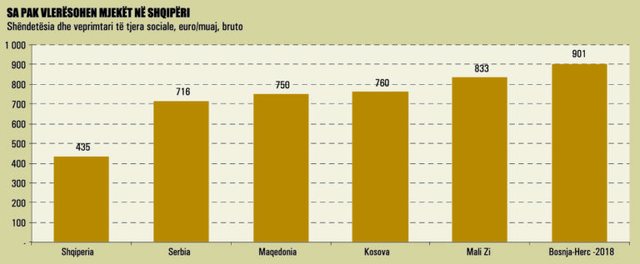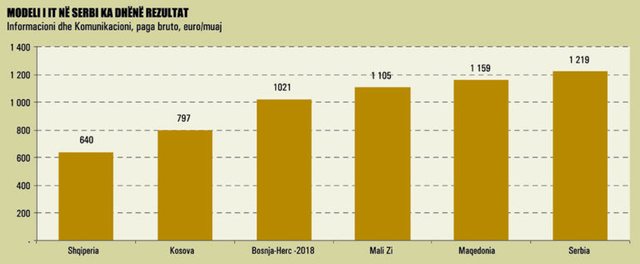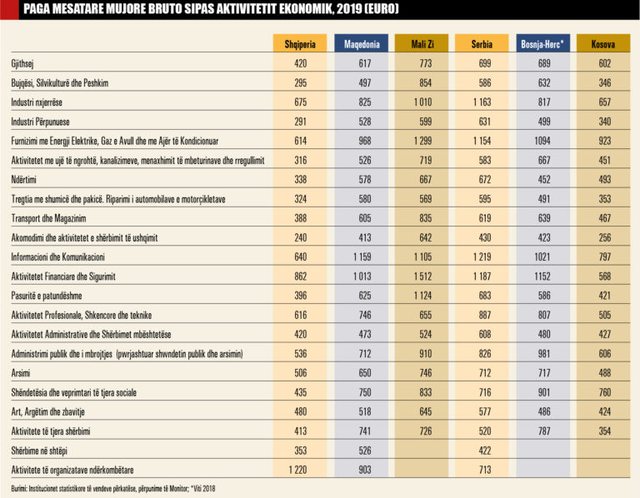
In any sector you choose to work in Albania, the salary per employee is the lowest in the region.
"Monitor" has compared the tables of gross salaries by economic activities, after processing data from statistical institutes of Albania, Macedonia, Serbia, Bosnia, Kosovo for 2019.
The average salary in Albania in 2019 was 420 euros, which is at least 30% lower than all other countries in the region. After Albania is ranked Kosovo (602 euros), Macedonia (617 euros), Serbia and Bosnia have an average salary of about 700 euros.
Employees in Montenegro are paid the most, at an average of 770 euros.
This level of salaries is in line with Eurostat data on per capita income, where Albania has one of the lowest in Europe, with 31% of the European average.
Although high informality in the labor market in the country may have an impact on this low level, wages are lower in the country, including education and medicine, or in activities where there is no informality, such as in the financial sector or telecommunications. .
Erald Pashaj, director of EPPC Albania & Kosovo, the recruitment and training company, told "Monitor Ekonomi" that the first reason for the wage gap with the region is the labor market. "Our economy produces so much and this is measured by gross domestic product per capita. In our region, we have the penultimate gross domestic product per capita in Europe, behind us is Kosovo.
As a result, this market produces fewer products and lower wages. "Other factors are the lack of foreign investment, the mentality we have for work, towards things and capital investments, accompanied by corruption and informality, which have made us have the lowest wages, both minimum and average in the region."
For example, in Kosovo, says Pashaj, an administrative assistant receives the amount of 600 euros, while in Albania it would be a very good salary, if he received 60 thousand lek. Only here we have a margin of more than 20%.
In the state, you get paid more in Bosnia
The highest salaries in the region in the public sector are paid in Bosnia and Herzegovina, averaging 980 euros. The International Monetary Fund has often claimed in its statements that Bosnia has a high spending bill for public sector wages, at about 13% of Gross Domestic Product (GDP). Even at the end of 2019, the government decided to increase public sector wages by 20%, in an effort to curb mass emigration to European Union countries, according to Reuters.

Montenegro (910 euros), Serbia (826 euros), Macedonia (712), Kosovo (606) also have high salaries in the administration.
Albania has the lowest revenues in the region to the Gross Domestic Product, together with Kosovo (about 26-27% of GDP) and this has conditioned the level of salaries in public administration, which at the level of 536 euros are more the lowest in the region.
How little doctors are paid
The COVID-19 pandemic, which caused a real storm across the globe, highlighted the importance of the health system in every country. Albania ranks among the countries with the least number of doctors (1.2 doctors per 1000 inhabitants), a number that is being reduced due to the mass exodus of white shirts. Our country, not only has fewer doctors, but they are also the highest paid. https://www.monitor.al/perballimi-i-koronavirusit-shqiperia-me-numrin-me-te-ulet-te-mjekeve-per-banore-ne-rajon/
The average salary in the activity of "Health and other social activities" in Albania is 435 euros, which is approximately half of the regional average. Doctors are paid more in Bosnia (901 euros) and Montenegro (833 euros), while in Serbia and Macedonia with over 700 euros.

Last year, Kosovo also significantly increased the salaries of doctors and nurses, with the aim of stopping the exodus of white shirts. Specialist doctors are paid 1195 euros (from 661 euros before); general practitioner 836 euros (out of 566), head nurses 621 euros (out of 472) and first nurses 537 euros (up from 425 previously).
Education, again underpaid
Teachers remain the lowest paid in the region, but the difference is lower compared to doctors.
The average salary in education is 506 euros. Montenegro pays teachers best, with almost 750 euros. In other countries, the fluctuation is between 650 and 710 euros.
Kosovo also pays little to education workers, at around 490 euros a month.
Serbia leads in information technology salaries
Serbia is often taken as an example and model for the development of information technology in the country. This sector has one of the highest salaries, not only in the country, but in the whole region, with an average of 1200 euros per month for information and communication activity. In more detail, in the subsection of computer programmers, the average salary is 1600 euros. (mostly in Serbia only air transport employees are paid).

Nabojsa Durdevic, CEO of Digital Serbia Initiative, says that IT businesses in Serbia have switched to high value-added services with local expertise, otherwise they could not compete if they were selling cheap software, as countries compete for this category. from Africa. He says that companies in the field of Information and Communication Technology in Serbia employ 95% of engineers. The focus is on moving to companies that develop their products and moving away from low value-added generic products. https://www.monitor.al/modeli-i-suksesit-te-serbise-ne-it-2/
Macedonia, Bosnia and Montenegro have salaries of over 1,000 euros for information and communication. Albania, as in any field, has the lowest, at 640 euros, while in Kosovo they are almost 800 euros.
For bankers, the record is held by Montenegro
Financial and banking activity is among the highest paid in Albania, with 860 euros per month on average, but still compared to the region remains much lower, except in Kosovo, which pays this sector less than in Albania (about 570 euros).
Bankers and insurance workers are the most valued in Montenegro, with an average salary of 1,500 euros, which is the highest in the region for all economic activities.
In other countries of the region, employees of banks and insurance companies receive on average more than 1000 euros per month.

In Albania, international institutions have the highest salaries
Not in vain, working in international institutions or non-profit organizations is highly preferred in Albania. INSTAT statistics show that they are more rewarding than in any other country. The average salary, if you work in international organizations, is around 1,200 euros per month. Other countries do not report all this economic activity, but in Macedonia, for the same category, the average salary is 900 euros and in Serbia 713 euros.
Source: Monitor





